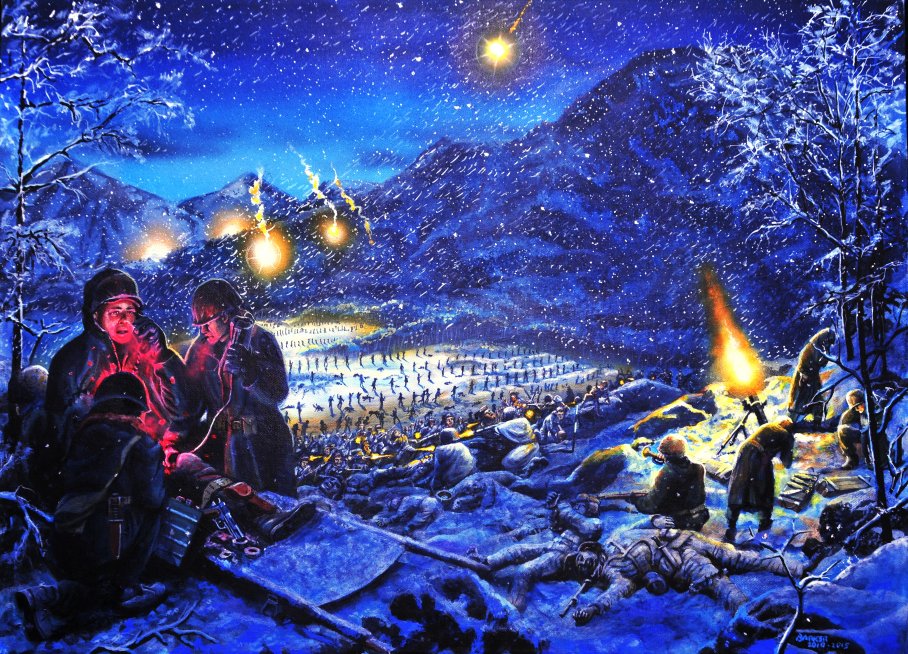
The Chinese Ninth Army entered the Korean War in the winter of 1950. Seventy thousand of them surrounded the 18,000 soldiers of the U.N. force assembled at the Chosin Reservoir. They had been directed by Mao Zedong to destroy the First Marine Division in particular. The Marines’ only option was to fight their way back to the coast along a narrow, twisting mountain road that ran through Toktong Pass. The job of holding it fell to Captain Bill Barber and the 218 men of Fox Company, 2nd Battalion, 7th Marines.
At dusk on 27 November Barber occupied a low hill overlooking a bend in the road with excellent fields of fire. The Chinese came marching up the road four abreast at 4:00 AM right into Barber’s machine guns. The Chinese dropped back and spread out, surrounding Barber’s position, launching repeated mass assaults. But the Marines held, and at dawn the Chinese melted away for fear of Marine air power.
Barber’s losses were heavy but the enemy’s were appalling. Barber was ordered by radio to abandon the position but insisted that he had too many wounded to move and that two Marine Regiments to his north were also surrounded and would need the pass to extricate themselves. He requested instead an airdrop of ammunition, medical supplies and radio batteries. He stood his ground.
In the end, Fox Company held off about 4,000 attackers for five nights in mind-numbing cold. Twenty Marines died, 54 were wounded and three were missing. The Chinese lost an estimated 2,000 men to Barber’s company and another 2,000 to daylight airstrikes.
Relief came mid-morning on the fifth day as Lt. Col. Ray Davis led his battalion for two days across the rugged terrain, fighting some enemy units and sneaking past others in the dark of night. Fox Company and the other units then fought their way to the relative safety of Hungnam on the coast and survived.
This painting depicts the north side of Fox Hill opposite the road on the south side. It’s the fourth night, about 2:30 in the morning, the temperature is 24 below and it’s snowing.
Captain Barber, at left, is on the radio adjusting artillery fire from Haguru, seven miles away. He was wounded in the groin the night before, stuffed a handkerchief in the wound and hobbled or crawled in order to direct his men. Presently he’s being treated for a second wound to the leg and continuing to supervise the defense while being carried on the stretcher.
The corpsman on the right has an IV bottle wrapped in a warm scarf and two morphine syrettes in his mouth to keep them from freezing. The foreground is littered with enemy dead who broke through the perimeter on previous nights.
An 81mm mortar crew at right has fired the illumination round seen descending on a small parachute overhead. Before it burns out, they are dropping another down the mortar tube. The flare reveals a tsunami of screaming Chinese regulars. The wave breaks as it hits the Marine perimeter.
In the center, below the mortar crew, a crouching Marine blows a captured Chinese signal bugle hoping to confuse the enemy. In front of him, two Marines wearing pieces of the resupply parachutes as camouflage are firing from behind the frozen Chinese dead they have stacked like sandbags. Further along the perimeter, dark figures are engaged in hand to hand combat with grenades, bayonets, gun butts, entrenching tools and fists.
After the battle Bill Barber spent three months in a hospital and retired from the Marine Corps as a Colonel in 1970. For his tenacious stance at Fox Hill he received the Medal of Honor in 1952.
I first learned about Capt. Barber and Fox Company in 2006 while painting the exhibit murals for the extraordinary immersive recreation of Toktong Pass at the National Museum of the Marine Corps in Quantico, Virginia.